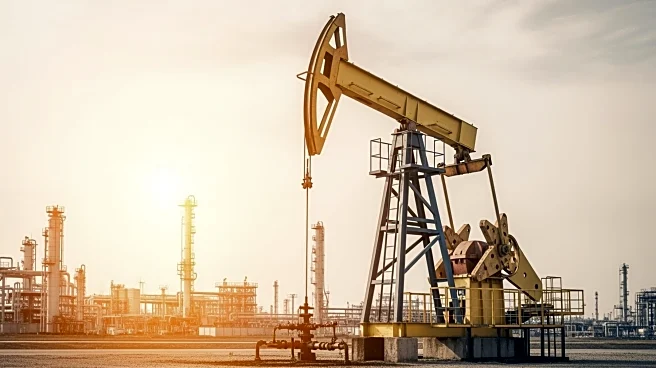What's Happening?
Libya is considering raising its oil output to 1.6 million barrels per day (bpd) next year, with further plans to reach 1.8 million bpd by 2027, according to Oil Minister Khalifa Abdulsadek. The country
aims to increase production to 2 million bpd within five years, as stated at the ADIPEC energy conference in Abu Dhabi. Libya's current production stands at approximately 1.4 million bpd. The minister highlighted the need for $3 billion to $4 billion in investments to achieve the target output. Libya is also collaborating with neighboring countries to establish infrastructure for a regional energy hub.
Why It's Important?
Libya's plans to boost oil production have significant implications for global oil markets and regional energy dynamics. As one of Africa's largest oil producers, Libya's increased output could influence global oil supply and prices, affecting economies dependent on oil exports and imports. For the U.S., changes in global oil supply can impact domestic energy costs and economic stability. Additionally, Libya's efforts to develop infrastructure and establish a regional energy hub may enhance its geopolitical influence and economic prospects, contributing to regional stability and cooperation.
What's Next?
Libya's plans to increase oil production will require substantial investments and infrastructure development. The country may seek partnerships and funding from international investors and neighboring countries to achieve its goals. The success of these initiatives could lead to increased regional cooperation and economic growth. Stakeholders in the oil industry, including producers and consumers, will likely monitor Libya's progress and its impact on global oil markets. Additionally, geopolitical developments and economic conditions may influence Libya's production strategies and regional collaborations.
Beyond the Headlines
Libya's efforts to boost oil production highlight the challenges and opportunities faced by countries with significant natural resources. The situation raises questions about the sustainability of current production practices and the need for diversification in energy sources. Libya's role in regional energy dynamics and its impact on geopolitical relations may also come under scrutiny, as the country navigates its path to increased production and infrastructure development.









